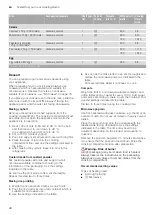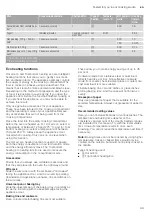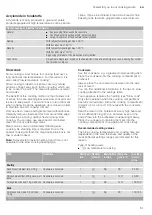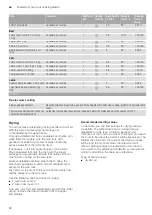
Tested for you in our cooking studio
en
37
Pizza, quiche and savoury cakes
Your appliance offers you a range of heating types for
preparing pizza, quiche and savoury cakes. You can
find the ideal settings for many dishes in the settings
tables.
Also refer to the notes in the section on allowing dough
to rise.
Only use original accessories supplied with your
appliance. These have been tailored to the cooking
compartment and the operating modes of your
appliance.
Baking in combination with a microwave
If you bake in combination with a microwave, you can
reduce the cooking time considerably.
In combined operation, you can use conventional
baking tins made from metal. If sparks form between
the baking tin and the wire rack, check whether the
baking tin is clean on the outside. Change the position
of the baking tin on the wire rack. If this does not help,
continue baking without the microwave. The baking
time will be extended.
If you use baking tins/dishes made from plastic,
ceramic or glass, the baking time indicated in the
settings tables will be reduced. The savoury cake will
not brown as much underneath.
Baking in combination with a microwave is only
possible on one level.
Shelf positions
Use the indicated shelf positions.
Baking on one level
When baking on one level, use the following shelf
position:
■
Level 1
Baking on two levels
Use Hot air. Baked items that are placed into the oven
on trays or in baking tins/dishes at the same time will
not necessarily be ready at the same time.
■
Universal pan: Level 3
Baking tray: Level 1
■
Baking tins/dishes on the wire rack
First wire rack: Level 3
Second wire rack: Level 1
By preparing several dishes at the same time, you can
make energy savings of up to 45 per cent. Position
baking tins/dishes next to one another or offset and
vertically stacked in the cooking compartment.
Accessories
Ensure that you always use suitable accessories and
that they are placed in the oven the right way around.
Wire rack
Slide the wire rack in with the embossed "microwave"
facing the appliance door, and the curved lip pointing
downwards. Always place ovenware, tins and dishes on
the wire rack.
Universal pan or baking tray
Slide the universal pan or the baking tray in carefully as
far as the limit stop with the bevelled edge facing the
appliance door.
Use the universal pan for pizzas with many toppings.
Baking tins
Dark- coloured metal baking tins are most suitable.
Tinplate baking tins, ceramic dishes and glass dishes
extend baking time and mean that the baked item will
not brown evenly.
Greaseproof paper
Only use greaseproof paper that is suitable for the
selected temperature. Always cut greaseproof paper to
size.
Frozen products
Do not use frozen products that are heavily frosted.
Remove any ice on the food.
Some frozen products may be unevenly pre-baked.
Uneven browning may remain even after baking.
Recommended setting values
The table lists the optimal heating type for various types
of food. The temperature and baking time depend on
the amount and consistency of the dough/mixture. For
this reason, the table specifies setting ranges. Try using
the lower values to start with. A lower temperature will
result in more even browning. You can use a higher
setting next time if necessary.
Note:
Baking times cannot be reduced by using higher
temperatures. The food would only be cooked on the
outside, but would not be fully baked in the middle.
The setting values apply to food that is placed into a
cold cooking compartment; by doing this, you can
make energy savings of up to 20 per cent.If you preheat
the oven, you can reduce the indicated baking times by
several minutes.
Preheating is necessary for selected food, and this is
indicated in the table. Do not place your food or
accessories into the cooking compartment until it has
finished preheating.
If you wish to follow one of your own recipes when
baking, you should use the setting values listed for
similar baked items in the table as reference.
Remove unused accessories from the cooking
compartment. This will ensure that you achieve the best
possible cooking results and energy savings of up to
20 per cent.
Types of heating used:
■
‚
Hot air
■
ƒ
Top/bottom heating
■
„
Circotherm intensive
















































